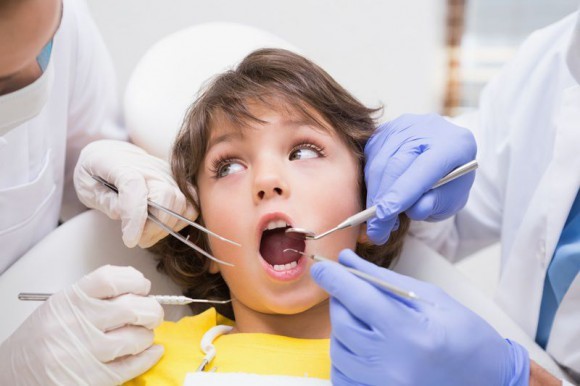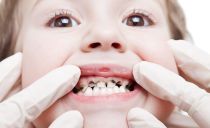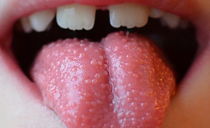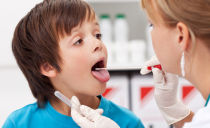Causes of decay of deciduous teeth in children in 1-2 years
The child’s body is constantly changing, so it is especially susceptible to adverse factors. In some cases, parents of young children find that their baby's teeth began to deteriorate.
In the event that a tooth decay is noticed in a child, only pediatric dentistry can help. Experienced doctors will heal your teeth and prevent further damage. For high-quality and comfortable treatment of a child’s teeth, you can contact the Stildent clinic without a doubt. They find an approach to each child, and give parents detailed advice on dental care. But to know what the causes of tooth decay are and whether it is possible to prevent or stop the process before the child is in the dentist's chair, every responsible parent should.

Content
Symptoms of decay of deciduous teeth
A periodic inspection, which is carried out by parents, can reveal the destruction of the crown of the tooth. The most common signs at the time when the baby is bite is formed:
- the appearance of depressions on enamel,
- teeth look like “eaten”,
- the presence of chips and cracks in the incisors, as a result of which the edge becomes uneven,
- carious caverns are noticeable,
- in case of eating cold or hot food or sour (sweet) dishes, the baby complains of pain,
- the presence of black or white spots on the enamel (enamel demineralization), but crumbling has not yet been noticed.
Causes of destruction
The main reason that children begin to crumble in children older than a year is the banal non-observance of the rules of oral hygiene or distortions in the diet. Sometimes teeth begin to deteriorate in infants who have not yet celebrated their first anniversary.
The reasons can be divided into several groups.
- Genetic predisposition.
- Poor nutrition.
- Violation of the state of health of a woman who is in the gestational period.
In some cases, the teeth crumble due to the presence of systemic pathology. The most common cause is bottle caries. Some children have a habit of biting hard objects, which causes tooth decay.
Hereditary causes
The possibility of early dental diseases becomes higher if one of the parents has thin and weak enamel. When teething, the baby's teeth can look quite healthy, but a weak and thin layer of enamel cannot last long and crumbling begins. In some cases, the first tooth already has formation defects. If the enamel looks porous, it means that the child has a mineralization defect.
Mom's condition during pregnancy
The teeth are laid in the child in the prenatal period. Therefore, the health of the mother, her full balanced nutrition have a direct impact on the formation of teeth. Milk teeth are laid before the 12th week of pregnancy. If at this time the mother was deficient in vitamins (group D) and mineral salts (fluorine, phosphorus, magnesium and potassium), then the child’s teeth will be weak and early development of caries is guaranteed.
Kid's menu
A diet that includes all the necessary minerals and vitamins is very important for the baby during fetal development.
Proper nutrition allows you to properly form all layers of tooth tissue.
If a child receives few vitamins and minerals, as well as minerals, then his teeth may not only begin to deteriorate, but growth will also slow down, bones will become thin and brittle.
Disease
In some cases, early destruction of enamel is a sign of a child having serious systemic diseases. At an early age, this is the cause of hereditary pathology. The development of serious diseases acquired, resulting in enamel crumbling, is very rare. Almost all hereditary diseases affect the entire bone tissue, and not just tooth enamel. Such diseases include the presence of a child:
- Hallerman-Streif syndrome,
- Marfan syndrome
- Ehlers-Danlos syndrome,
- clavicular cranial dysostosis,
- Praders-Willi syndrome,
- dysplasia near the bowel,
- taurodontizma
- local odontodysplasia
- tricho-dento-bone syndrome,
- imperfection of amelogenesis and dentinogenesis.
What to do to stop the destruction
Destruction of dentin and enamel at an early age causes the child not only inconvenience and pain, but also causes a number of negative phenomena that will affect the future life of the child. Lack of treatment can infect the molars, which are in their infancy, and the child will receive serious problems during the growth of permanent teeth.
Calcium deficiency
One of the main signs that the child does not have enough calcium in the body is his irresistible desire to eat chalk and gnaw the plaster. If not every child can reach the chalk (he simply may not be in the house), then the plaster of each child is practically at hand. Do not scold the baby. It is better to take this symptom seriously and consult a treating pediatrician who will prescribe calcium in tablet form. It is also necessary to take calcium preparations under the supervision of a doctor.
Bottle Caries
The terrible diagnosis of “bottle caries” is a sign of excessively long use of the bottle and pacifier or nipple. The presence of foreign objects in the mouth violates the correct formation of the bite due to which the teeth can begin to deteriorate faster.
Doctor consultation
Before starting treatment, it is necessary to find out what caused the decay of primary teeth. Only on this basis is the choice of treatment strategy.
If heredity became the cause of tooth decay, then complete healing is impossible. You can only respond to the problem by conducting symptomatic treatment.
Dentist visits
If there is such a problem as crumbling of milk teeth, you must regularly take the baby to the dentist and choose the right menu for him. These measures will slow down the destruction of enamel. A delayed visit and a delay in solving the problem will lead to the development of serious pathologies in the child.
The doctor will treat all the foci of caries and close all the cracks on the enamel (including microcracks). If the teeth deteriorate as a result of hygiene or poor nutrition, then changing the menu and regular (2 times a day) brushing will partially solve the problems.
Balanced diet
Preventive measures in the presence of problems with teeth include:
- the baby’s stay in the fresh air (sunlight will reduce the deficiency of vitamin D in the body), which will strengthen bone tissue,
- regular inclusion in the menu of dishes with a high content of calcium and vitamins (fish, cottage cheese, fruits, vegetables, cheeses, etc.),
- closing fissures with special sealants (microscopic grooves located on the enamel surfaces of molars and premolars),
- enamel silvering, which allows to neutralize pathogenic bacteria and slow down the development of caries,
- fluoridation, which helps saturate enamel of milk teeth with fluorine.
Silvering helps well in the early stages, but in the presence of advanced caries, this procedure is not recommended.




